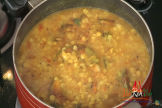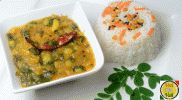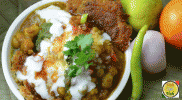
An exotic dal recipe cooked with eggplant. This dish is excellent and even healthier to ...
Dalmoth is a traditional namkeen, dry snack, It is one of popular snack in North India ma...

Murungai Keerai ( Drumstick Leaves ) is a significant source of beta-carotene, Vitamin C...

Ragda Pattice is yet another chaat recipe from Mumbai. I also like to eat just the ragda ...
Bitter Gourd is considered as the bitterest of all vegetables, but when combinedwith othe...

Adai is made of lentils and rice which is usually prepared for breakfast. It is perfect n...
Murungai Keerai ( Drumstick Leaves ) is a significant source of beta-carotene, Vitamin C, protein, iron, and Potassium. It's widely used in the dal and curries.
Drumstick Leaves Dal – Murungakeerai paruppu is an excellent lentil stew rich in vitamins, proteins etc., and is very high in nutritious. This Drumstick leaves dal is commonly known as... Read More..
|
About Recipe
|
|||||||||||||||||||||||||||||||||||||||||
|
|||||||||||||||||||||||||||||||||||||||||
Drumstick Leaves Dal – Murungakeerai paruppu is an excellent lentil stew rich in vitamins, proteins etc., and is very high in nutritious. This Drumstick leaves dal is commonly known as Murungakeerai Paruppu in South India especially Tamil Nadu. It is a soft and appetizing lentil stew made with tur dal, cooked with drumstick leaves (Murungakeerai) and spices mixed together making this a tangy and savory dish. Drumstick leaves dal is often served with hot rice and can also be eaten with chapatti or roti.
Drumstick leaves provides essential amount of iron and calcium especially for women especially. These leaves were extensively used in siddha medicine in India. Drumstick scientifically called as Moringa oleifera is commonly known as Shevaga (in Marathi), Murungai (Tamil), Muringnga (Malayalam) and Munagakaya (Telugu) in different Indian languages. Drumstick is the most widely cultivated species of the genus Moringa comes from the Moringaceae family.
In South India, it is used to prepare a variety of sambar and is also fried. In other parts of India, especially West Bengal and Bangladesh, it is made into a variety of curry dishes by mixing with coconut, poppy seeds, and mustard or boiled until the drumsticks are semi-soft and consumed directly without any extra processing or cooking. It is used in curries, sambars, kormas, and dals, although it is also used to add flavor to cutlets, etc.
In Maharashtra, the pods are used in sweet & sour curries called Aamatee. Tender drumstick leaves, finely chopped, are used as garnish for vegetable dishes, dals, sambars, salads, etc. It is also used in place of or along with coriander, as these leaves have high medicinal value. In some regions the flowers are gathered and cleansed to be cooked with besan to make pakoras. Drumstick leaves or Muranga Keerai is considered the ‘Queen of all Greens’ as it is valued for having the richest source of beta carotene among all green leafy vegetables.
Drumstick tree also known as Moringa Oleifera is basically a very common tree widely grown across India and grown in backyard of most Indian homes. There is a saying that if you have a drumstick plant in your garden that symbolizes that you have a doctor at home. It is the best home remedial medicine used for curing most of the common diseases and is the most recommended spinach variety for all the age groups.
How to prepare Drumstick Leaves Dal – Murungakeerai Paruppu:
Ingredients:
Directions:
Drumstick leaves and Tur dal is a powerhouse with innumerable health benefits. They complement well with each other in flavour, taste and texture. They are also rich in iron, calcium and vitamin C.
To try more of my popular drumstick recipes and delight your palate with different variations, do click on: https://www.vahrehvah.com You could always reach me at my below links:
My Cooking Videos Indian Recipes Indian Food Regional Indian Cuisines VahChef Sanjay Thumma
Enjoy Cooking! Keep Smiling…


Neththra'sVision Posted on Tue Jul 23 2013
All parts of this tree helps prevent over 300 known diseases. I'll note a tiny bit of things what Murungakeerai leaves can do, it controls blood pressure, blood sugar,arthritis, ulcers and use to treat anemia and strengthen immune system. I must
Reply 0 - Replies
Neththra'sVision Posted on Tue Jul 23 2013
I must thank you first for making a dish using Murungakeerai. What you said is true, lot of people don't care of these leaves. This is another one of our family favorite leaves, these leaves has unbelievable amount nutrition value and a lot of he
Reply 0 - Replies
John Lopez Posted on Tue Jul 23 2013
Ah malunggay...try cooking it with coconut milk only..or with green moong,super awesome.
Reply 0 - Replies
Ranjani Ramanujam Posted on Tue Jul 23 2013
Hi chef..how to make murungakirrai bhaji?
Reply 0 - Replies
gollamudipakala Posted on Wed Jul 24 2013
It is very easy to separate leaves of drumstick by keeping the drumstick branch in the folds of a towel or mat for a whole night and tap it in the morning,they will fall off easily.
Reply 0 - Replies
Luke Ware Posted on Wed Jul 24 2013
Thank you Neththra for this great information. I do know this has some sort of medicinal value and know that this enhances the immune system but you have given a very good description of it... Thanks again and God bless :)
Reply 0 - Replies

machakare Posted on Wed Jul 24 2013
i still can't understand why you add tamarind to Dhal. which v never do it in malaysia.
Reply 0 - Replies
ddmalluri Posted on Wed Apr 29 2015
Please add Moringa leaves to the title so that many people looking for recipes of Moringa leaves will benefit.?
Reply 0 - Replies
 Easy recipes
Easy recipes
 Healthy Recipes
Healthy Recipes
 Dessert Recipes
Dessert Recipes
 Mutton and Lamb
Mutton and Lamb  Indian Bread Recipes
Indian Bread Recipes
 Dal Recipes
Dal Recipes
 Chutney and Pickles
Chutney and Pickles  Indo-Chinese Recipes
Indo-Chinese Recipes
 Snacks and Appetizers
Snacks and Appetizers
 Low Fat Recipes
Low Fat Recipes
 Chaat Recipes
Chaat Recipes
 Biryani and Rice
Biryani and Rice  Curry Recipes
Curry Recipes
 Indian Sweet Recipes
Indian Sweet Recipes
 Egg Recipes
Egg Recipes
 Paneer Recipes
Paneer Recipes
 Chicken Recipes
Chicken Recipes
 Indian tiffins
Indian tiffins
 Egg less Recipes
Egg less Recipes
 Soups and Salads
Soups and Salads
 Indian Sea Food
Indian Sea Food
 Manchurian Recipes
Manchurian Recipes
 Indian Drinks Recipes
Indian Drinks Recipes
 Dinner Recipes
Dinner Recipes
Nisha K Posted on Tue Jul 23 2013
Pls giv the English names for the North Indian recipes too !!!!!
Reply 0 - Replies